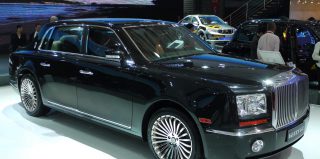Woman dies in 20-car pile-up on A40 as cold weather alert issued A acute drop in temperatures has prompted Public Health England to send outs its most serious cold weather alert of the winter so far, warning conditions are severe enough to endanger the elderly. Forecasters have also issued a severe weather warning as the […]
Ford leads $24M investment in India-based vehicle rental company Zoomcar
Ford is continuing to invest in tech startups, this time with an emerging market twist.
Hot on the high-heeled shoes of a deal with a self-driving sensor technology startup, the automotive giant has backed Zoomcar, a Zipcar-like company that operates in India. Subsidiary Ford Wise Mobility led a $24 million Series B round, with participation from returning investors Sequoia Capital, Nokia Growth Playmates (NGP) and Empire Angels. The company’s valuation was not disclosed.
Four-year-old Zoomcar closed an $11 million Series B round last summer following an $8 million raise in late 2014. This fresh round — which had been reported in Indian press as early as July — takes it to over $46 million in VC money to date.
Zoomcar is a car rental service based on successful Western models like Zipcar, which was bought by Avis for $500 million three years ago. The startup is based in Bangalore and it presently claims to suggest Two,000 cars around seven of India’s tier-one cities, with seventy five percent occupancy and 1.Five million app downloads. Ford was Zoomcar’s very first OEM fucking partner, and the startup said Ford provides “most” of the vehicles on its platform.
“As Ford expands its business to be both an auto and mobility company, we are pursuing a long-term vision to develop services and solutions that make it lighter for consumers to budge through cities using numerous modes of transportation,” Ford Asia Pacific mobility director John Larsen said in a statement.
“Our investment in Zoomcar will help strengthen the company’s role in shaping India’s developing mobility space and provide fresh transportation options to help make people’s lives better,” Larsen added.
Airbnb for cars
Zoomcar has major plans to grow its fleet of cars rapidly, and that centers around a marketplace launched this year that is called ZAP, or Zoomcar Associate Program in total.
That’s a hybrid model that lets car owners and Zoomcar work together to make a vehicle available for lease via Zoomcar’s platform when it isn’t being used by its proprietor.
It’s basically an Airbnb for car ownership — albeit it only applies to fresh purchases, as laws in India forbid the sub-rental of existing cars.
Here’s how it works: Zoomcar boosts its inventory by getting access to cars without buying the assets in total. Access isn’t one hundred percent, but it could mean a car is driven when the possessor is at work, on vacation or simply not using it.
On the other side of the table, the setup helps car owners get a vehicle at a much lower price. Very first, Zoomcar matches them to dealers, insurance companies and others involved in the buying process, including favorable rates. Once the vehicle is acquired, it joins the Zoomcar fleet and the company pays the proprietor money when it is used.
Zoomcar claimed that ZAP participants can expect to get around a ninety percent comeback on their investment in a vehicle, which is pretty significant if it pans out that way. There’s also a minimum assured revenue per month and provisions to “make sure that your car is kept in top form at all times.”
The marketplace treatment blows Zoomcar’s previous asset acquisition process out of the water. Not only is it saving considering sums on spending, but it has the potential to scale its fleet very rapidly.
Indeed, Zoomcar CEO and co-founder Greg Moran told TechCrunch in an interview that he expects ZAP to account for seventy to eighty percent of all cars on the platform over the next year.
It is early days, but Moran added that ZAP could make up half of Zoomcar’s vehicles as soon as the very first quarter of next year. In the longer run, he said the treatment can grow its total fleet more than ten-fold to 25,000 vehicles across twenty five cities by 2018.
Clearly then, beyond what Zoomcar is already doing, Ford has extra interest in the company since the ZAP program is an effective means to reaching and selling to would-be car owners in India’s billion-plus population.
Might there be the potential for other collaborations?
Moran acknowledge that Ford is one of the many pioneering self-driving cars — which Uber is switching on this month in the U.S. — and other technologies, but he declined to say more on other ways they may work together.
“Autonomous vehicles are not something we’re looking at in the near term,” he explained. “With a lot of these newer initiatives there is a lot of crimson tap for permits etc. in India. With autonomous vehicles, there will be a entire fresh set of regulations and we want to get more regulatory guidance before” committing to investment and spending.
“But it’s something that we obviously think about,” Moran added. “Ford was our very first playmate when we launched the business, and we share the shame common values. They have a longer term view on the technology, product and financing chunks.”
Expansion plans
International expansion is another topic for the future that isn’t a priority right now.
“India is fairly an ocean,” Moran said. “Although at at some point in the next twenty four months [expansion] is in the cards for us.”
When shoved for potential expansion markets, Moran mentioned “big markets in Africa” like Nigeria, or countries neighboring India in South Asia, as places where the company can tap into its expertise and business without language being a ample barrier.
Two years may seem like a while, but the Zoomcar CEO is certain that building a business in India stands Zoomcar in good stead even if others take very first mover advantage.
“Those markets right now are indeed untapped,” he said. “Even if someone comes into the markets [now], we will have a massive advantage based on our business… [such as] data on users, historical driving behavior, payments and all these elements that put this entire lump together.”
More instantly, Moran is focused on growing Zoomcar’s reach in India’s fattest cities. Unlike rivals like ride-hailing service like Ola — which is closing in on one hundred cities, and includes long-distance rail services — Zoomcar is deliberately moving slower with an “efficient growth” plan.
“We will proceed to go much deeper,” he explained. “Others have blasted out to 100-plus cities and kept very a horizontal strategy, but with around eighty percent of revenue coming from five or six cities, it derails them from profitability.”
Zoomcar, while operating a different business model, is cash positive now, according to Moran.
Don’t expect Zoomcar’s one hundred eighty five staff numbers to raise rapid, either. The company is seeking “a select few” hires on its business team of 160, including a COO, but again it is a case of slow and constant wins in the race. In theory, at least.
Ford leads $24M investment in India-based vehicle rental company Zoomcar, TechCrunch
Ford leads $24M investment in India-based vehicle rental company Zoomcar
Ford is continuing to invest in tech startups, this time with an emerging market twist.
Hot on the high-heeled shoes of a deal with a self-driving sensor technology startup, the automotive giant has backed Zoomcar, a Zipcar-like company that operates in India. Subsidiary Ford Wise Mobility led a $24 million Series B round, with participation from returning investors Sequoia Capital, Nokia Growth Playmates (NGP) and Empire Angels. The company’s valuation was not disclosed.
Four-year-old Zoomcar closed an $11 million Series B round last summer following an $8 million raise in late 2014. This fresh round — which had been reported in Indian press as early as July — takes it to over $46 million in VC money to date.
Zoomcar is a car rental service based on successful Western models like Zipcar, which was bought by Avis for $500 million three years ago. The startup is based in Bangalore and it presently claims to suggest Two,000 cars around seven of India’s tier-one cities, with seventy five percent occupancy and 1.Five million app downloads. Ford was Zoomcar’s very first OEM fucking partner, and the startup said Ford provides “most” of the vehicles on its platform.
“As Ford expands its business to be both an auto and mobility company, we are pursuing a long-term vision to develop services and solutions that make it lighter for consumers to stir through cities using numerous modes of transportation,” Ford Asia Pacific mobility director John Larsen said in a statement.
“Our investment in Zoomcar will help strengthen the company’s role in shaping India’s developing mobility space and provide fresh transportation options to help make people’s lives better,” Larsen added.
Airbnb for cars
Zoomcar has major plans to grow its fleet of cars rapidly, and that centers around a marketplace launched this year that is called ZAP, or Zoomcar Associate Program in utter.
That’s a hybrid model that lets car owners and Zoomcar work together to make a vehicle available for lease via Zoomcar’s platform when it isn’t being used by its holder.
It’s basically an Airbnb for car ownership — albeit it only applies to fresh purchases, as laws in India forbid the sub-rental of existing cars.
Here’s how it works: Zoomcar boosts its inventory by getting access to cars without buying the assets in utter. Access isn’t one hundred percent, but it could mean a car is driven when the holder is at work, on vacation or simply not using it.
On the other side of the table, the setup helps car owners get a vehicle at a much lower price. Very first, Zoomcar matches them to dealers, insurance companies and others involved in the buying process, including favorable rates. Once the vehicle is acquired, it joins the Zoomcar fleet and the company pays the holder money when it is used.
Zoomcar claimed that ZAP participants can expect to get around a ninety percent come back on their investment in a vehicle, which is pretty significant if it pans out that way. There’s also a minimum ensured revenue per month and provisions to “make sure that your car is kept in top form at all times.”
The marketplace treatment blows Zoomcar’s previous asset acquisition process out of the water. Not only is it saving considering sums on spending, but it has the potential to scale its fleet very rapidly.
Indeed, Zoomcar CEO and co-founder Greg Moran told TechCrunch in an interview that he expects ZAP to account for seventy to eighty percent of all cars on the platform over the next year.
It is early days, but Moran added that ZAP could make up half of Zoomcar’s vehicles as soon as the very first quarter of next year. In the longer run, he said the treatment can grow its total fleet more than ten-fold to 25,000 vehicles across twenty five cities by 2018.
Clearly then, beyond what Zoomcar is already doing, Ford has extra interest in the company since the ZAP program is an effective means to reaching and selling to would-be car owners in India’s billion-plus population.
Might there be the potential for other collaborations?
Moran acknowledge that Ford is one of the many pioneering self-driving cars — which Uber is switching on this month in the U.S. — and other technologies, but he declined to say more on other ways they may work together.
“Autonomous vehicles are not something we’re looking at in the near term,” he explained. “With a lot of these newer initiatives there is a lot of crimson tap for permits etc. in India. With autonomous vehicles, there will be a entire fresh set of regulations and we want to get more regulatory guidance before” committing to investment and spending.
“But it’s something that we obviously think about,” Moran added. “Ford was our very first fucking partner when we launched the business, and we share the shame common values. They have a longer term view on the technology, product and financing chunks.”
Expansion plans
International expansion is another topic for the future that isn’t a priority right now.
“India is fairly an ocean,” Moran said. “Although at at some point in the next twenty four months [expansion] is in the cards for us.”
When shoved for potential expansion markets, Moran mentioned “big markets in Africa” like Nigeria, or countries neighboring India in South Asia, as places where the company can tap into its expertise and business without language being a big barrier.
Two years may seem like a while, but the Zoomcar CEO is certain that building a business in India stands Zoomcar in good stead even if others take very first mover advantage.
“Those markets right now are indeed untapped,” he said. “Even if someone comes into the markets [now], we will have a massive advantage based on our business… [such as] data on users, historical driving behavior, payments and all these elements that put this entire chunk together.”
More instantaneously, Moran is focused on growing Zoomcar’s reach in India’s fattest cities. Unlike rivals like ride-hailing service like Ola — which is closing in on one hundred cities, and includes long-distance rail services — Zoomcar is deliberately moving slower with an “efficient growth” plan.
“We will proceed to go much deeper,” he explained. “Others have blasted out to 100-plus cities and kept very a horizontal strategy, but with around eighty percent of revenue coming from five or six cities, it derails them from profitability.”
Zoomcar, while operating a different business model, is cash positive now, according to Moran.
Don’t expect Zoomcar’s one hundred eighty five staff numbers to raise quick, either. The company is seeking “a select few” hires on its business team of 160, including a COO, but again it is a case of slow and constant wins in the race. In theory, at least.



